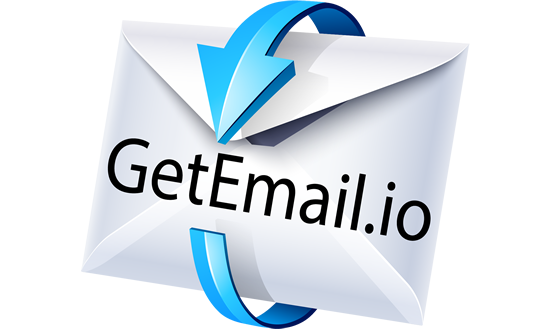What does a successful salesperson, marketer and recruiter have in common? Their ability to reach out to the right people at the right time!
When networking, people usually think reaching out to everyone from an organization is safest move. However, it’s no more than throwing darts in the dark – even if you hit the bullseye one time, it might not work the next time.
One of the best ways to ensure your outreach lands in front of the most relevant individuals is through email sourcing by job title. And GetEmail.io is the just the right tool that helps you find right people using their job title.
In this blog, we’ll dive into the importance of email sourcing by job title and why targeting specific decision-makers within organizations can help improve your outreach strategies.
We’ll also explore the benefits, methods of sourcing, and ethical considerations that ultimately help you to connect with key stakeholders and decision makers.
The Importance of Targeting Decision-Makers in Email Sourcing
Email sourcing by job title is all about identifying and acquiring email addresses of professionals holding specific roles within a company.
The process ensures that your messages are read by the ones who are interested in your product, service or offer – and the power to take an action! Let’s learn other significances.
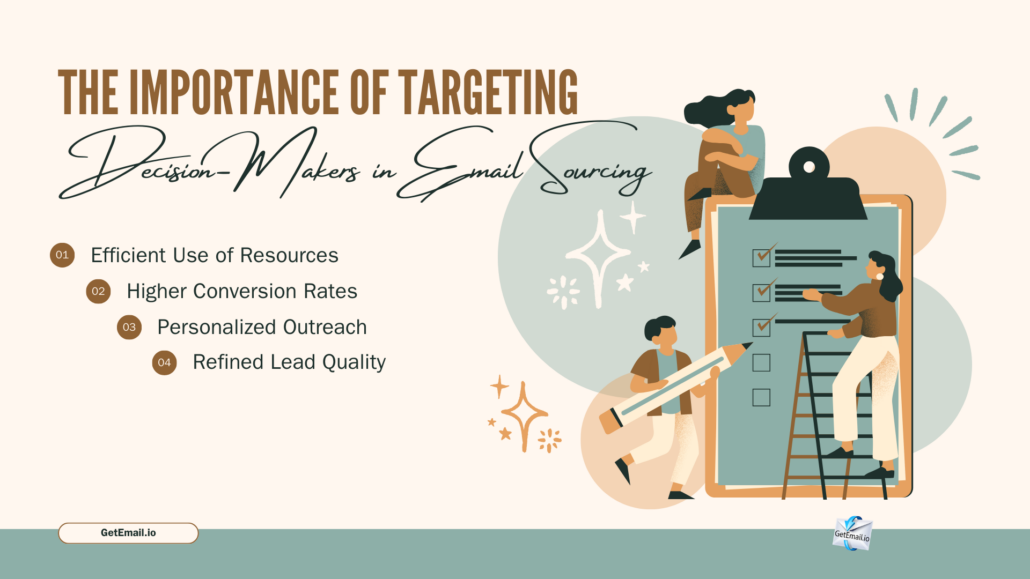
Email sourcing by job title is all about identifying and acquiring email addresses of professionals holding specific roles within a company.
The process ensures that your messages are read by the ones who are interested in your product, service or offer – and the power to take an action! Let’s learn other significances.
- Efficient Use of Resources
One of the main advantages of targeting specific job titles is efficiency. Every organization runs with a discipline with layers of different managements. So, when you identify and reach out to that one management head, you bypass all other individuals who do not have the authority or influence to move forward.
How does this benefit? You will definitely save tons of time, back-&-forth communication, and resources on irrelevant contacts. You also get to focus on the ones who can actually drive the outcome you’re seeking.
- Higher Conversion Rates
When your emails land in the inbox of someone with the power to make decisions, you significantly increase your chances of converting that lead into a customer or partner.
Decision-makers like department heads, C-level executives, and managers are often responsible for purchasing decisions, strategic partnerships, or hiring. When you reach out to them directly, your messaging is more likely to resonate and close the deal.
- Personalized Outreach
A study also reveals that highly personalized emails that include personalized messages and subject lines have an increase in reply rate up to 142%! Email sourcing by job title allows you to personalize your outreach in ways that are highly relevant to the recipient’s role.
Let’s take an example. A CFO may be interested in the financial benefits of your offering, while a CMO would be more concerned with how it enhances brand visibility. This specificity helps you create messaging that speaks directly to their pain points, increasing the likelihood of engagement.
- Refined Lead Quality
In email marketing, the quality of your leads is far more important than the quantity. By targeting specific job titles, you naturally improve the quality of your leads, focusing on individuals who are more likely to convert. Instead of chasing general contacts, you’re honing in on the people who have the budget, need, or authority to make a purchase decision.
Top Job Titles to Target When Email Sourcing
Now, depending on your industry, the job titles you prioritize for email sourcing will vary. However, in most business contexts, key decision-makers typically fall within specific categories.
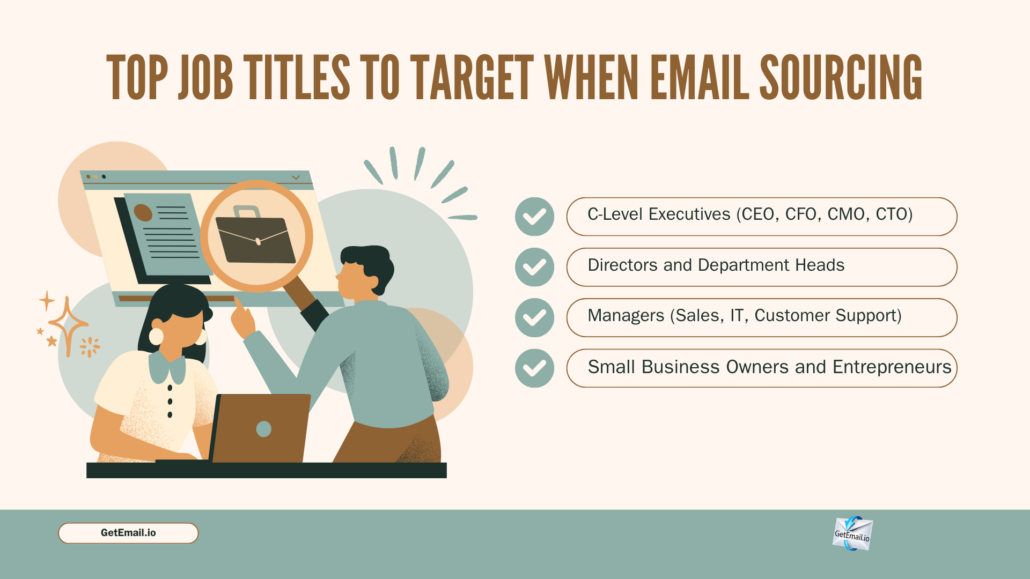
Let’s explore some of the most common job titles to target based on the type of business or outreach:
- C-Level Executives (CEO, CFO, CMO, CTO)
C-level executives are the highest-ranking individuals in an organization and are responsible for overall business strategy, company-wide decisions, and major investments. While they are often difficult to reach, connecting with them can fast-track decisions, especially for strategic partnerships, major deals, or high-value products and services.
- CEO (Chief Executive Officer): The CEO is responsible for the overall vision and direction of the company. Reaching out to CEOs can be beneficial if you’re offering directly impacts the entire organization or aligns with the company’s strategic goals.
- CFO (Chief Financial Officer): The CFO focuses on the financial health of the company. For businesses offering financial tools, cost-saving solutions, or investment opportunities, the CFO is the ideal target.
- CMO (Chief Marketing Officer): CMOs manage the company’s marketing efforts. If your product or service involves marketing, branding, advertising, or customer engagement, the CMO is likely to be interested.
- CTO (Chief Technology Officer): For businesses in tech, software, or IT services, the CTO is the decision-maker responsible for overseeing technology investments.
- Directors and Department Heads
Directors and department heads are high-level managers who oversee specific areas of the business, such as marketing, operations, HR, or finance. While they may not have the same authority as C-level executives, they often have a considerable influence on purchasing decisions related to their departments.
- Marketing Director: If your business offers digital marketing services, advertising solutions, or customer relationship management (CRM) tools, targeting a marketing director is key.
- Operations Director: Operations directors are responsible for ensuring that the business runs smoothly and efficiently. They are ideal targets for companies offering operational software, planning solutions, or supply chain services.
- HR Director: HR directors oversee recruitment, employee engagement, and talent management. For companies offering recruitment platforms, HR software, or benefits packages, reaching out to HR directors is essential.
- Managers (Sales, IT, Product, Customer Support)
Managers are often responsible for the day-to-day decisions in their departments and have a direct impact on operational functions. While they may not make high-level strategic decisions, they are often tasked with researching, evaluating, and recommending products or services.
- Sales Manager: Sales managers are responsible for managing the sales team and improving sales performance. Businesses offering sales tools, CRM software, or training can target sales managers to pitch their solutions.
- IT Manager: IT managers oversee the company’s technology infrastructure. If your offering involves cybersecurity, cloud computing, or software solutions, IT managers are the go-to contact.
- Product Manager: Product managers focus on product development and delivery. For businesses offering tools related to product lifecycle management, customer feedback, or development platforms, reaching out to product managers is effective.
- Small Business Owners and Entrepreneurs
In smaller companies, business owners or entrepreneurs often serve as the main decision-makers. Unlike in large corporations, where decision-making is divided among different executives and managers, small business owners have the final say on all aspects of the business—from marketing to finance to operations. So, reaching out to them and initiating a conversation becomes much more of a simpler process.
Various Methods for Sourcing Emails by Job Title
The best part of email sourcing is that there is not one-size-fits-all approach. There are multiple methods that help you get the right contact information. Let’s look at some of the most effective ones.
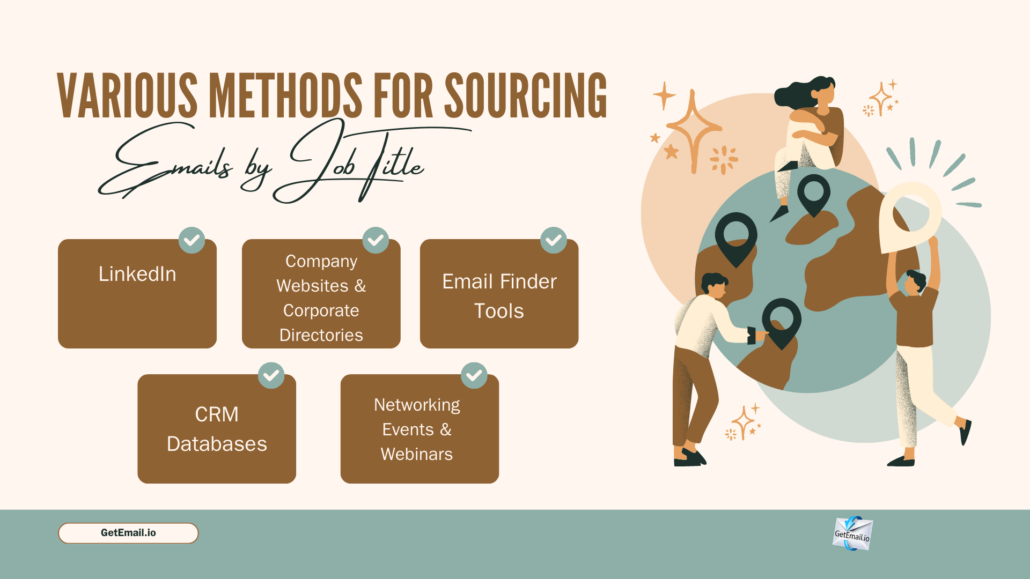
1. LinkedIn
LinkedIn is a treasure trove of professional data, offering detailed information about individuals’ job titles, industries, companies, and more. Tools like GetEmail.io allow you to filter searches by job title, making it easy to find decision-makers at specific companies. Once you’ve identified the right contacts, it can also help extract email addresses.
Protip: GetEmail.io also has integration with Make.com and Zapier to make email sourcing easy for you. You can add multiple steps like searching to collecting, then sending emails, all at once. Check out the link here for more integrations!
2. Company Websites and Corporate Directories
Many companies list their executives, directors, or department heads on their websites, often with email addresses or contact forms. Corporate directories and “About Us” pages are valuable resources for finding key personnel and their contact information.
3. Email Finder Tools
Several email finder tools are designed specifically for sourcing emails based on job titles. Tools like ours GetEmail.io, Hunter.io and Snov.io allow users to search for emails by entering a job title or domain, delivering verified email addresses of the desired contacts. You can use our chrome extensions to connect to your Gmail as well as Salesforce accounts.
4. CRM Databases
Customer Relationship Management (CRM) platforms often come with built-in databases of leads and prospects, allowing you to filter by job title, industry, or company size. Tools like Salesforce, HubSpot, and Zoho offer search features for identifying the right contacts.
5. Networking Events and Webinars
In-person and virtual networking events often provide opportunities to connect with professionals in specific roles. Attend these industry-specific webinars, conferences, or workshops to engage with decision-makers directly. You can then follow up by sourcing their emails through professional directories or email finders.
Best Practices for Email Sourcing by Job Title
Now that you’ve sourced the email addresses of the right people, it’s now time to approach them strategically. It is more crucial than you expect it to be because a single email can either make your dreams come true or break it altogether. Here’s what you can do.
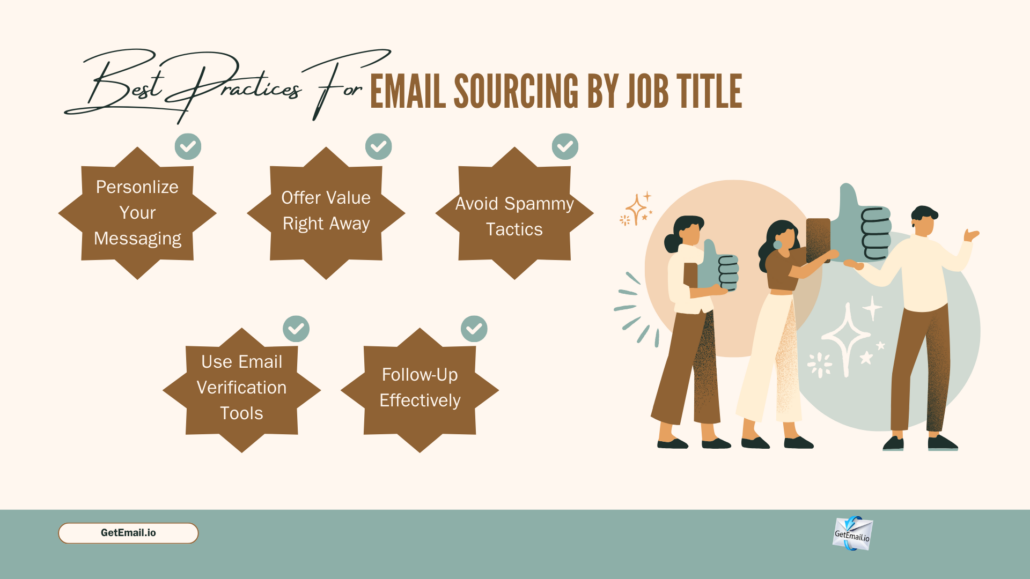
- Personalize Your Messaging
The most important rule in email sourcing is to personalize your emails. Address the recipient by their name, mention their specific role, and tailor your message to their pain points or interests. Personalized emails are far more likely to be opened and acted upon than generic, one-size-fits-all outreach. Personalizing the subject line can help you improve your email open rate by 33%!
- Offer Value Right Away
When emailing decision-makers, focus on the value you can provide. Whether it’s solving a specific problem, increasing efficiency, or saving costs, make sure your value proposition is clear from the start. Busy professionals don’t have time to wade through long-winded messages—get to the point quickly!
- Avoid Spammy Tactics
Bombarding decision-makers with unsolicited emails or using overly aggressive sales tactics can harm your reputation. Instead of sending mass emails, focus on a targeted, thoughtful approach that emphasizes quality over quantity. Respect the recipient’s time and boundaries. In fact, a study confirms that bulk cold emails sent from the same email address improves reply rates by 93%.
- Use Email Verification Tools
Even if you’ve sourced emails using reliable tools, always verify them before sending. Invalid email addresses can lead to high bounce rates, damaging your email sender reputation. GetEmail.io along with many email finder tools offer built-in verification features that ensures the authenticity of the email addresses.
- Follow-Up Effectively
It’s common for decision-makers to miss your first email due to busy schedules. A polite and timely follow-up email can significantly improve your response rates. Be sure to remind the recipient of your initial message and reinforce the value you’re offering.
What Are the Ethical Considerations in Email Sourcing by Job Title
While targeting decision-makers is a highly effective strategy for outreach, it’s important to approach email sourcing with ethical practices to avoid harming your reputation or violating legal regulations. Here are key ethical considerations to keep in mind:
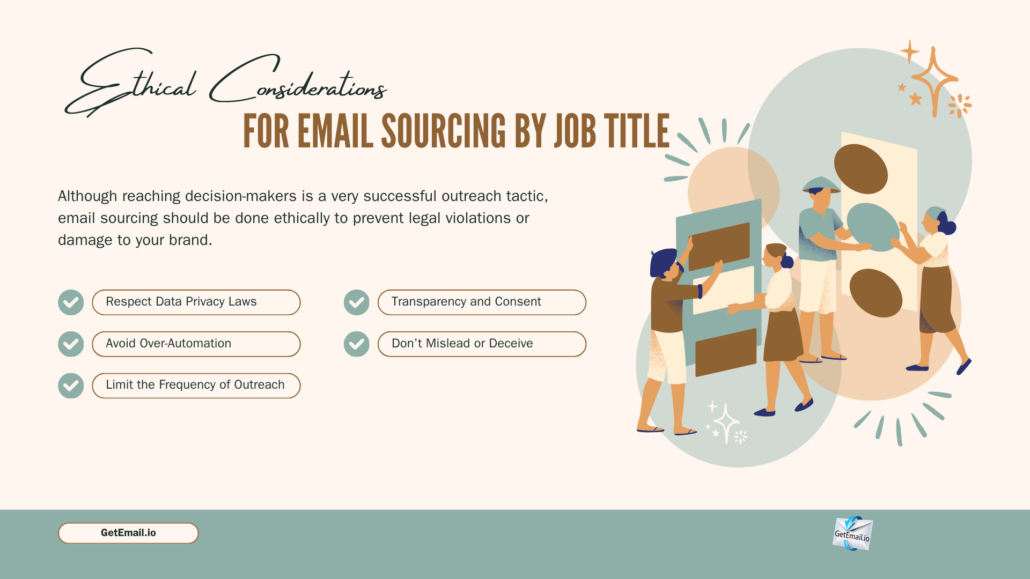
1. Respect Data Privacy Laws
Email sourcing and prospecting must always comply with local and international data privacy regulations. Laws such as the General Data Protection Regulation (GDPR) in the EU and the CAN-SPAM Act in the U.S. set clear guidelines for email communication. Ensure you understand the legal requirements for obtaining and using someone’s email address for business outreach. Many of these laws require explicit consent from the recipient before you can send promotional emails, so always adhere to the regulations relevant to the region in which you’re operating.
2. Transparency and Consent
Being transparent about how you sourced someone’s email is essential. While email finder tools help you locate emails, it’s important not to abuse this access. Where possible, request consent or provide an option to opt out of future communications. Including a clear unsubscribe link in your emails ensures recipients can easily manage their preferences, which also keeps you in compliance with legal obligations.
3. Avoid Over-Automation
Although automation tools can help scale email campaigns, you shouldn’t overuse them to the point of losing the human touch. Over-automated campaigns can feel impersonal and intrusive, especially when targeting high-level professionals. Focus on quality interactions and make sure your outreach feels genuine and considerate of the recipient’s time and needs.
4. Don’t Mislead or Deceive
There’s a reason why “honesty is the best policy” is still relevant to this day. Misleading subject lines, fake referrals, or deceptive promises might capture a recipient’s attention temporarily, but they will damage your credibility in the long run. Build trust by providing clear, honest, and relevant information from the start.
5. Limit the Frequency of Outreach
Even if your message is personalized and valuable, sending too many emails can become overwhelming and push prospects away. Be mindful of how often you reach out to decision-makers. Following up is important, but overloading someone’s inbox can result in them marking your emails as spam, which negatively affects your sender reputation.
The Role of Email Personalization in Targeting Decision-Makers
Decision-makers are bombarded with countless emails daily, so you need to stand out by speaking directly to their unique needs and responsibilities. Here’s how personalization plays a crucial role in targeting the right individuals:
1. Address Their Role and Responsibilities
When reaching out to someone based on their job title, mention aspects of their role that relate to your product or service. For example, if you’re contacting a Chief Technology Officer (CTO), focus on how your solution can streamline their technology stack or improve operational efficiency. By acknowledging their responsibilities, you show that you’ve done your homework and that your message is relevant.
2. Tailor the Value Proposition
Your value proposition should align with the priorities of the recipient’s job title. For example, a CFO will care more about cost savings and return on investment (ROI), whereas a marketing director may focus on customer acquisition and brand visibility. By customizing your pitch to match the recipient’s priorities, you’re more likely to capture their interest.
3. Refer to Relevant Pain Points
Understanding the common pain points that decision-makers face in their roles lets you to position your solution as the answer. For instance, an HR director might struggle with employee retention or recruitment costs. If your product or service addresses these pain points, highlighting this in your email demonstrates that you’re in tune with their challenges and can offer a valuable solution.
4. Leverage Data and Case Studies
Decision-makers are typically data-driven, so backing up your claims with relevant data, statistics, or case studies adds credibility to your message. Highlighting real-world success stories, especially from companies similar to theirs, can build trust and make your outreach more persuasive.
Measuring Success With Key Metrics for Email Sourcing Campaigns
Assess the effectiveness of your email sourcing efforts by tracking key performance indicators (KPIs). Here are some of the most important metrics to monitor when targeting decision-makers via email:
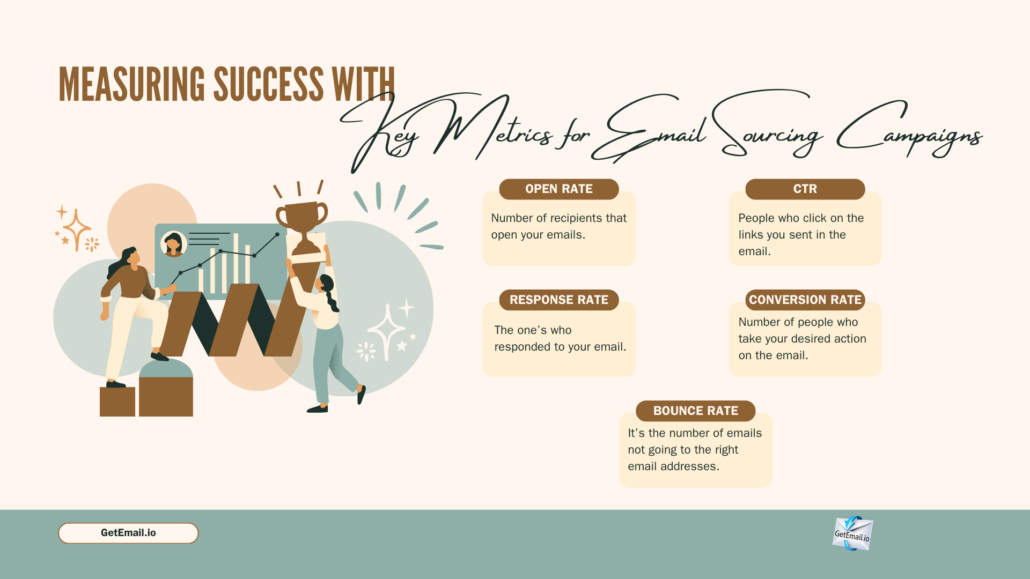
Assess the effectiveness of your email sourcing efforts by tracking key performance indicators (KPIs). Here are some of the most important metrics to monitor when targeting decision-makers via email:
1. Open Rate
The open rate measures how many recipients opened your email. A low open rate may indicate that your subject line isn’t compelling or that you’re targeting the wrong job titles. Experiment with different subject lines and adjust your targeting strategy based on these insights.
2. Click-Through Rate (CTR)
The click-through rate tracks the number of people who clicked on a link in your email. If your CTR is low, it may suggest that your message or value proposition isn’t resonating with the recipient, or that your call-to-action (CTA) isn’t clear or enticing enough.
3. Response Rate
The response rate measures how many people replied to your email. A high response rate indicates that your outreach is personalized and relevant to the decision-maker. If your response rate is low, you may need to refine your messaging or offer more value in your email.
4. Conversion Rate
Your conversion rate tracks how many of the decision-makers you reached out to take the desired action, whether that’s signing up for a demo, making a purchase, or scheduling a meeting. This is the most important metric, as it directly reflects the effectiveness of your email sourcing efforts.
5. Bounce Rate
A high bounce rate suggests that you’re sending emails to invalid or outdated addresses. Minimize bounces and always use email verification tools before launching your campaign to ensure that the email addresses you’ve sourced are valid. Learn how to reduce bounces and spam rates in the other detailed blog.
Rewinding All Things Discussed
Email sourcing by job title is an incredibly powerful strategy for reaching the right decision-makers within an organization. Focus your efforts on key individuals—such as C-level executives, directors, department heads, and managers— to ensure that your message lands in front of the people who have the authority to make purchasing decisions, approve projects, or form partnerships.
This targeted approach allows you to personalize your outreach, improve lead quality, and maximize conversion rates. However, you also need to adhere to the policies and laws to maintain compliance.
After all, refine your strategy at every interval to the finalize on the one that actually gives you desired results.
